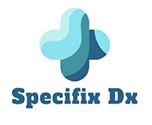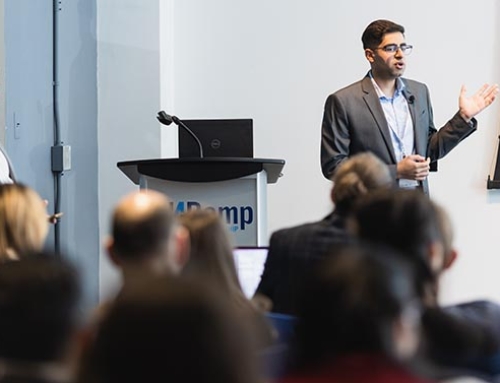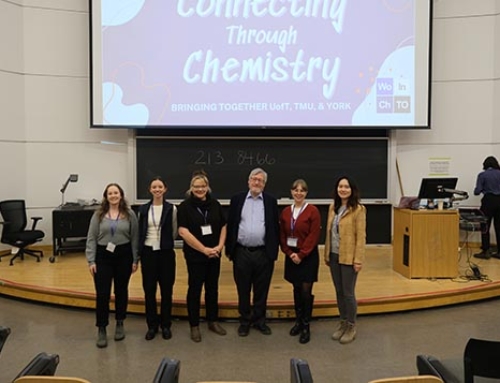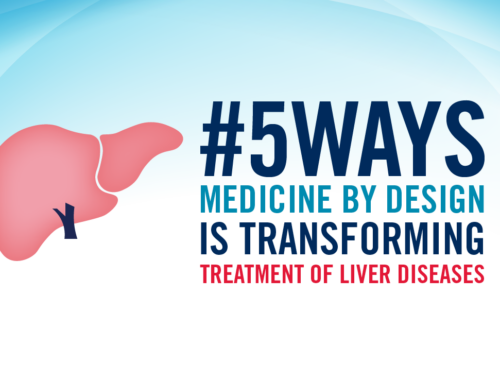
2022 winners, DTPx Therapeutics, make their presentation at the Building a Biotech Venture Pitch Competition.
At the University of Toronto and its affiliated hospitals, research trainees including graduate students, post-doctoral fellows and research associates are on the forefront of regenerative and precision medicine research.
The Building a Biotech Venture Pitch Competition will feature six teams working on a range of innovations including discovering new drug compounds, engineering cell therapies, preventing neurodegeneration and revolutionizing eye treatments.
Both regenerative medicine, which aims to regenerate and repair the body with stem cells and other living therapies, and precision medicine, which focuses on the personalization of preventions and treatments for individual patients, are research areas that will be the future of medicine, says Allison Brown, Medicine by Design’s executive director.
“The trainees in our pitch competition will be showcasing tomorrow’s innovations,” says Brown. “Research they are doing today will be a part of the next generation strategies in these cutting-edge fields that expand our capabilities to treat disease.”
The teams will pitch their ideas in front of four expert judges for the chance to receive one of two research funding grants, valued at $25,000 and $10,000.
The Pitch Competition is the culmination of the Building a Biotech Venture program, an education program that gives participants a foundation in commercializing a real-world technology or product that has emerged from their lab research.
The program is a collaboration between Medicine by Design, an initiative that drives regenerative medicine research at U of T and its affiliated hospitals toward clinical impact; the Precision Medicine Initiative (PRiME), a U of T initiative that aligns research efforts in the area of precision medicine; the Health Innovation Hub (H2i), a campus-linked accelerator at U of T’s Temerty Faculty of Medicine; and Talk Boutique, a full-service speaker representation and coaching company.
“Past participants in our pitch competition have gone on to win other competitions and have joined accelerators such as Creative Destruction Lab. The Building a Biotech Venture program gives teams the foundation to successfully begin to translate their discoveries and technologies,” says Brown.
The Building a Biotech Venture program is designed to complement trainees’ scientific education.
“What we aim to do with this program is to teach trainees the skills they need outside of the lab — business concepts like regulatory affairs and intellectual property, and how to communicate their research, for example,” Sarah De La Rue, director of strategy and partnerships at PRiME, says. “All participants in the program come out with skills that will give them a strong foundation whether they end up founding a startup or staring a career elsewhere in the biotech ecosystem”
Meet the teams
 CApt Dynamics
CApt Dynamics
Unlocking the potential of nucleic acids in molecular diagnostics and therapeutics.
CApt Dynamics introduces a cutting-edge platform that uses AI and high dimensional medical devices to discover new compounds that can target, diagnose and potentially treat various diseases.
Team members: Armin Geraili, Dingran Chang
The Kelley Lab, Leslie Dan Faculty of Pharmacy, University of Toronto
 Myoxa Therapeutics
Myoxa Therapeutics
Re-engineered cell therapies for improved transplant success.
Myoxa aims to engineer cell therapies that allow a graft to stay alive in low oxygen settings, which is a major shortcoming in using cell-based grafts for clinical therapy.
Team members: Aanshi Gandhi, Aaron Rosenstein, Mohammad Saleh, Danielle Serra, Maria Nguyen
The Garton Lab, Institute of Biomedical Engineering, University of Toronto
 Neuropeutics
Neuropeutics
Alleviating pathology, treating neurons.
Neuropeutics’ mission is to ameliorate patients’ lives by prioritizing the advancement of small molecule to the clinic, which prevents toxic clumping of a protein involved in neurodegeneration.
Team members: Marc Shenouda, Namita Multan
The Robertson Lab, Department of Laboratory Medicine & Pathobiology, University of Toronto
 Specifix Dx
Specifix Dx
A point-of-care rapid test that detects urinary tract infections with significantly greater accuracy.
Specific Dx has developed UroStix, which is a paper-based rapid test that can detect urinary tract infections (UTI) with significantly greater accuracy compared to conventional tools in use today.
Team members: Jessican Jenkins, Siobhan Wilson, Jaspreet Randhawa
The Ferenbok Lab, Department of Laboratory Medicine & Pathobiology, University of Toronto
 StemTEST
StemTEST
Screening services for effective formula & treatment discovery.
StemTEST is developing a human stem cell derived skin model combined with AI software to objectively test the efficacy of skin products marketed for reducing hyperpigmentation.
Team members: Henry Quach, Kayshani Kanagarajah, Krista Antonio, Yuetong Song
The Wong Lab, Program of Developmental & Stem Cell Biology, The Hospital for Sick Children
 Synakis
Synakis
Solutions for the eye.
Synakis has developed Syngel, which could replace the natural vitreous in the eye for patients with ocular disorders such as retinal detachment and dry-age-related macular degeneration (AMD).
Team members: Mickael Dang, Adam Forman, Jonathan Labriola
The Shoichet Lab, Institute of Biomedical Engineering, University of Toronto
Meet the judges
- Angela MacDonald, Entrepreneur-in-Residence, Versant Ventures
- Gary Margolis, Chief Executive Officer, Notogen
- Mathew Platt, Head of Venture Recruitment, Creative Destruction Lab
- Robin Quirk, Vice President Technology Sourcing & Venture Development, CCRM






